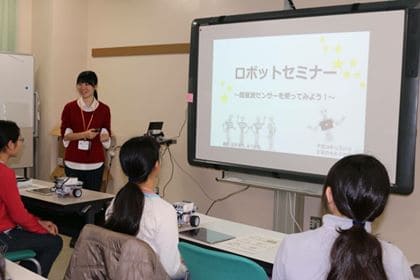
Emma Fox, former Robogals president at Sussex University in England
“From personal experiences, I believe the biggest barrier preventing more women entering engineering is a lack of education and misconceptions about the subject.
“Engineering is often perceived as a heavy-duty, labour intensive job but more times than not, this isn’t the case. There are so many different sectors within engineering with lots of them utilising computers to solve tasks, and all of them offering a wealth of opportunities and exciting careers.
“To challenge stereotypes and bridge the gender gap, I feel children from a young age should be exposed to engineering in a fun and creative manner.
“In the past, some all-girls schools have not offered the same subjects as all-boys schools, but this needs to change so that all students have the chance to study subjects such as electronics and computer science.
“Teachers and parents need to be made aware that engineering is an interesting, rewarding and successful career choice and actively encourage girls to pursue the subject. I am very fortunate that from a young age I was supported by my parents to tinker with machinery on the family farm and troubleshoot equipment. This helped ignite my passion for engineering at a more advanced level.”

Satomi Ono, Rino Urushihara and Erika Satomi from Tokyo in Japan
“The gender ratio in the engineer job market has improved recently. However, it is tough for female engineers to settle in the same or switch to different workplaces when they choose other life stages such as marriage, pregnancy or family member's transfer. As a result, the majority of Japanese female job-seekers from engineering background rather choose positions for non-engineers.
“The evaluation criteria for job applications should be set equally. Affirmative action systems adopted by some companies sounds equal but sometimes trigger a side-effect that females are urged to work with males who have stronger skill sets.
"The main reason fewer women are in STEM industry might be girls limit themselves from getting into STEM. They may internalise the message of "girls cannot do well in STEM," which prevents them from studying the subjects. Therefore, I would like to change such a stereotype and the role of gender in society.”
Abigail Noelle Espino, Robogals CDO President at the Xavier University in Cagayan de Oro in The Philippines
"The Philippines boasts its status of having the narrowest gender gap in Asia and 10th globally, as reported by the World Economic Forum’s 2017 Global Gender Gap Index. However, when it comes to women in technology and engineering courses, only 29 per cent of enrolled are females.
“Most female students pursue studies and eventually careers in medicine and related fields instead of pursuing Engineering and Technology courses. This may have to do with parents who encourage their children to pursue medicine as it is perceived to be more prestigious in the Philippines.
“A regional disparity when it comes to STEM careers also negatively affects the chances of more women in Engineering. Careers/Education opportunities in STEM are concentrated around the country’s National Capital Region. This indicates that females from outside this area have less interest in pursuing this field due to the lack of quality education and employment opportunities.
“Another factor would be stereotypes encountered by girls. Females are expected to take on family-caring responsibilities. Biases against women also play a role in Philippine engineering gender disparity. An article by Divya Sharma in 2018 states that women in the country ranked much less than their male counterparts in terms of labour force participation, wage equality for similar work, estimated earned income, and in the number of women holding leadership positions in the workplace.”

Catherine Akinyi Odera, Robogals Training Manager and 5th-year, Geospatial Engineering student at the University of Nairobi in Kenya
“Kenya has a low turn-out of women in Engineering. This is caused by various factors.
“The Engineering field is male-dominated and this has led to a lot of masculinity, stereotypes, and prejudice in that line of work. Women are not given the chance to find their niche which discourages many from furthering their studies and careers.
“Most women prefer to take up less demanding careers since they are expected to get married and have time for their families.
“From a young age women believe that they are not good at Mathematics (the backbone of Engineering) hence they concentrate more on Art based courses. The few that are courageous enough to "take the bull by its horns" are the lady Engineers that you will meet around.
“Most women have the ability to pursue Engineering but lack the enthusiasm to pursue challenging courses. They need some form of mentorship to jump-start their potential.
“Women prefer to be in places where they are surrounded by other women (their social circle for assurance), and hence the lack of women in engineering discourages some from venturing in the same field.”
Chloe Innis, Robogals Operations Manager and 4th Year Biomechanical Engineering student at Queen's University, Canada
"I think that the biggest barrier for getting more women into engineering is awareness. It’s very important that young girls are aware of their options for the future, and a shocking lack of girls are not educated in STEM career options.
“The first step to getting more women into engineering is making all young girls and women aware of various STEM options so that they can make an educated decision for their futures."
MORE FROM THE STUDENT ENGINEER




Red Bull makes hydrogen fuel cell play with AVL
Formula 1 is an anachronistic anomaly where its only cutting edge is in engine development. The rules prohibit any real innovation and there would be...